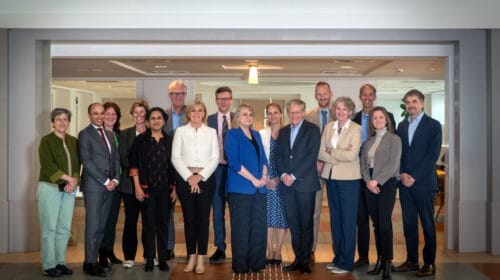Barry Jhay: The curious case of Nigerian music and young, wealthy label owners

In the 80’s, dirty money from drug dealers and fraudsters ruled and funded Nigerian entertainment. Fuji, Juju and Apala artists would hail Nigerian celebrities and socialites across the world because from those men came the real money.
At Nigerian parties, the 90’s trend was to spray foreign currencies at parties. This was how men of the underworld flaunted their opulent lifestyles.
But by the 90’s, a lot of wealthy Nigerians – even ones with genuine sources of wealth – adopted this opulent lifestyle. They would appreciate the homage from these artists by spraying foreign currencies. Some of these wealthy individuals also became patrons and grand patrons to different entertainment and artistic endeavours.
By the 2000s, Yinka Ayefele refined the style and turned the final 15-20 minutes of all his albums into a gratitude session to all the wealthy Nigerians he’d benefited from, presumably over the previous year or 18 months.
ALSO READ: How Internet fraud has taken over Nigerian music
The early 2000s also came with the rise of the internet and internet-based fraudulent activities, which became Nigeria’s version of the cocaine epidemic in African-American neighborhoods. Kids who grew up in poverty would watch their idols get successful off ‘yahoo yahoo’ and would aspire to it.
The mid-2000s also saw the rise of individual artist-led record labels and big-boy sponsored Nigerian labels. A little later, Nigerian celebrities like 9ice, Olamide, Reminisce, Slimcase and more would hail big boys like Opa 6, BaddyOsha, H-Money and more.
These big boys were usually young Nigerians men who acquired wealth early and chose to heavily invest in the music business. Some famous instances are;
- G Worldwide and Kizz Daniel.
- Barry Jhay and Karshy Godson.
- Eric Many and Runtown.
- Achievas and Solidstar.
All of these situations ended in tears. Some were settled in court, some are still ongoing while Barry Jhay and Karshy’s ended in death.
Why do these situations end in tears?
Big boy-led or not, it’s a Nigerian phenomenon for label deals to end in some form of rift, court battles or even violent confrontation.
This happens because Nigerian artists usually grow to become selfish and self-centred after they succeed. There are terrible, sketchy label owners, but the fate, life expectancy and expected success of a Nigerian record label is akin to that of a startup on Silicon Valley.
The Nigerian music industry is fundamentally dysfunctional. Labels have to overspend before they stand any chance of making any profit. Funds are expended on branding the artist, putting him or her in comfort, video shoots, music production, payments, transportation and even payola.
The average Nigerian can’t afford these types of expenditure without getting uncomfortable. Hence, the importance of these big boys to the ecosystem. They can afford to spend hefty sums on talented artists because they spend millions at the club, anyway.
At the start of label situations, these ‘big boys’ are like the Easter Bunny to a lot of young men. Nigeria is littered with talented young men who were failed by a system with entrenched problems. The streets form the basis of their artist development and they grind through the day, hoping for better days.
This grim reality is exemplified in Davolee’s Festival Bar franchise. For a lot of these young Nigerian men, these ‘big boys’ are a saving grace; a means of upliftment and a blessing from God to potentially change the course of entire families.
“Record labels are also a form of vanity for [these big boys],” says a Nigerian music industry veteran.
They get public adulation and their names are sung on hit records. A source also reveals to Pulse Nigeria that like Law Firms, record labels are a potent avenue for money laundering – if said big boy has a shady source of income.
When some of these artists get big enough and see the income they generate, they forget the deal they signed with the label, they forget their grim origin stories and start demanding a higher cut of the revenue.
“Forget the issue of revenue splits. I’m not saying managers aren’t shady, but artists forget their own share of the revenue also comes with costs,” Godwin Tom said on a panel during the 2019 Social Media Week. “It can get frustrating. They only see their revenue, not the deal they signed or expenses they incur.”
Aside from the improper structure in Nigerian music, these situations also go sour because business and pleasure excessively overlap.
A former artist manager, now based in Germany tells Pulse Nigeria that, “The label owners are usually inexperienced, and they fail to separate business from pleasure and business transactions from personal transactions. That line is always important, but it’s usually blurred in these situations.
“They make some of these artists comfortable enough that even they [the label owners] exceed the terms of legally binding record contracts. This usually happens through lavish undeserved gifts and expensive outlays.
“Some of these label owners then unknowingly make their own artists excessively comfortable and even too laidback. In the early 2010s, I managed a super-talented artist who never blew because his label boss gave him so much that he practically forgot how to make music [laughs].”
With the Barry Jhay situation, we find ourselves on these unholy grounds yet again. But this time, a label boss is murdered. It has gone beyond the Runtown-Dilly situation where a gun was reported pulled. This also happens as Kizz Daniel’s issues with G Worldwide continue to blow hot and cold.
But in some cases, like YSG and Vector, time and maturity clears the cloud of uncertainty and warring parties become friends.
What’s the solution?
With Nigeria’s reality, there is no solution. There is an excessive amount of talented Nigerian artists who require ‘big boy’ funding and we would be insensitive to simply say they shouldn’t take it. They will take it and they should take the money.
They should just ensure that they learn from previous unfortunate situations. But as we’ve discovered over the years, these things are unlikely to end.
It’s sad, but that’s our reality.




